Connect With Us
Blog
Items filtered by date: December 2024
How Diabetes Affects the Feet
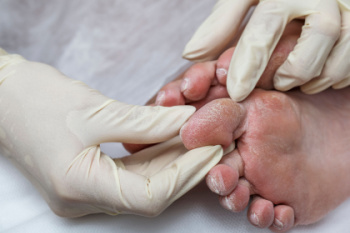
Diabetes can significantly impact the health of the feet, leading to complications that may affect the toes, feet, and ankles. Over time, high blood sugar levels can damage the peripheral nerves, a condition known as diabetic neuropathy. This nerve damage can cause tingling, pain, or loss of sensation, which makes it difficult to notice injuries like blisters or cuts. When unnoticed and untreated, these minor issues can develop into infections or ulcers. Diabetes also can impair blood circulation to the feet, reducing the ability to heal and increasing the risk of gangrene in severe cases. People with diabetes may also develop foot deformities, such as Charcot's foot, which causes swelling and bone changes that alter the shape of the foot. Preventive measures are essential, including regular inspections by a podiatrist, along with improved daily foot care habits. A podiatrist can monitor your feet for early signs of complications and offer appropriate wound care treatment as needed. If you have foot problems as a complication of diabetes, it is suggested that you schedule regular appointments with a podiatrist for an exam, diagnosis, and treatment.
Diabetic foot care is important in preventing foot ailments such as ulcers. If you are suffering from diabetes or have any other concerns about your feet, contact William Beaton, DPM from Advanced Podiatry and Wound Care. Our doctor can provide the care you need to keep you pain-free and on your feet.
Diabetic Foot Care
Diabetes affects millions of people every year. The condition can damage blood vessels in many parts of the body, especially the feet. Because of this, taking care of your feet is essential if you have diabetes, and having a podiatrist help monitor your foot health is highly recommended.
The Importance of Caring for Your Feet
- Routinely inspect your feet for bruises or sores.
- Wear socks that fit your feet comfortably.
- Wear comfortable shoes that provide adequate support.
Patients with diabetes should have their doctor monitor their blood levels, as blood sugar levels play such a huge role in diabetic care. Monitoring these levels on a regular basis is highly advised.
It is always best to inform your healthcare professional of any concerns you may have regarding your feet, especially for diabetic patients. Early treatment and routine foot examinations are keys to maintaining proper health, especially because severe complications can arise if proper treatment is not applied.
If you have any questions please feel free to contact our office located in St. Petersburg, FL . We offer the newest diagnostic and treatment technologies for all your foot and ankle needs.
Pickleball Injuries

Pickleball is a favorite among older adults, but its rapid pace and quick movements often lead to lower extremity injuries, particularly in older male players. Ankle sprains and strains are among the most common, caused by twisting during sudden stops or changes in direction. These injuries can result in swelling, pain, and limited mobility, requiring rest and proper support to heal. Achilles tendon ruptures are another frequent issue, especially during powerful lunges or quick sprints. This injury, which often begins with a sharp pain or a snapping sensation, may require surgical intervention for a full recovery. Wearing supportive footwear, warming up, and strengthening the lower legs can help minimize these risks. If you experience persistent pain or an injury from playing pickleball, it is suggested that you consult a podiatrist to explore effective treatment options and prevent further complications.
Ankle and foot injuries are common among athletes and in many sports. They can be caused by several problems and may be potentially serious. If you are feeling pain or think you were injured in a sporting event or when exercising, consult with William Beaton, DPM from Advanced Podiatry and Wound Care. Our doctor will assess your condition and provide you with quality foot and ankle treatment.
Common Injuries
The most common injuries that occur in sporting activities include:
- Achilles Tendonitis
- Achilles Tendon Rupture
- Ankle Sprains
- Broken Foot
- Plantar Fasciitis
- Stress Fractures
- Turf Toe
Symptoms
Symptoms vary depending upon the injury and in some cases, there may be no symptoms at all. However, in most cases, some form of symptom is experienced. Pain, aching, burning, bruising, tenderness, tightness or stiffness, sensation loss, difficulty moving, and swelling are the most common symptoms.
Treatment
Just as symptoms vary depending upon the injury, so do treatment options. A common treatment method is known as the RICE method. This method involves rest, applying ice, compression and elevating the afflicted foot or ankle. If the injury appears to be more serious, surgery might be required, such as arthroscopic or reconstructive surgery. Lastly, rehabilitation or therapy might be needed to gain full functionality in the afflicted area. Any discomfort experienced by an athlete must be evaluated by a licensed, reputable medical professional.
If you have any questions, please feel free to contact our office located in St. Petersburg, FL . We offer the newest diagnostic and treatment technologies for all your foot care needs.
Custom Orthotics For Foot and Heel Pain

Step into relief and reclaim your mobility! Foot and heel pain can be a thing of the past with the right Custom Orthotics. Customized to your unique foot structure, they provide the support and alignment needed to alleviate discomfort. Whether you're walking, running, or simply standing, Custom Orthotics ensure every step is cushioned and pain-free. Don't let foot ailments dictate your day. With Custom Orthotics, embrace a world of comfort and freedom. Call today to schedule an appointment.
Common Reasons for Ankle Pain Upon Waking
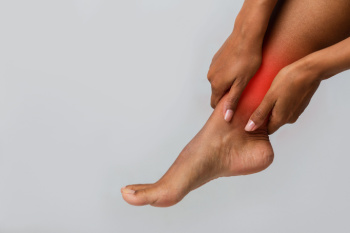
Waking up with ankle pain can be caused by several factors. One common reason is the dawn phenomenon, which refers to increased inflammation and stiffness that occurs in the early morning, often due to the body’s natural circadian rhythms. Arthritis, particularly osteoarthritis, can lead to morning ankle pain as the joints become stiff overnight, making movement difficult. Inflammation caused by overuse, poor posture, or injury can also contribute to discomfort. Plantar fasciitis, a condition that affects the bottom of the foot, can also cause pain in the ankle area, especially in the morning when taking the first few steps. This pain is often sharp and decreases with movement as the tissues loosen up. If you are experiencing any type of ankle pain, it is strongly suggested that you contact a podiatrist who can determine what the cause is, and offer appropriate treatment solutions.
Ankle pain can have many different causes and the pain may potentially be serious. If you have ankle pain, consult with William Beaton, DPM from Advanced Podiatry and Wound Care. Our doctor will assess your condition and provide you with quality foot and ankle treatment.
Ankle pain is any condition that causes pain in the ankle. Due to the fact that the ankle consists of tendons, muscles, bones, and ligaments, ankle pain can come from a number of different conditions.
Causes
The most common causes of ankle pain include:
- Types of arthritis (rheumatoid, osteoarthritis, and gout)
- Ankle sprains
- Broken ankles
- Achilles tendinitis
- Achilles tendon rupture
- Stress fractures
- Tarsal tunnel syndrome
- Plantar fasciitis
Symptoms
Symptoms of ankle injury vary based upon the condition. Pain may include general pain and discomfort, swelling, aching, redness, bruising, burning or stabbing sensations, and/or loss of sensation.
Diagnosis
Due to the wide variety of potential causes of ankle pain, podiatrists will utilize a number of different methods to properly diagnose ankle pain. This can include asking for personal and family medical histories and of any recent injuries. Further diagnosis may include sensation tests, a physical examination, and potentially x-rays or other imaging tests.
Treatment
Just as the range of causes varies widely, so do treatments. Some more common treatments are rest, ice packs, keeping pressure off the foot, orthotics and braces, medication for inflammation and pain, and surgery.
If you have any questions, please feel free to contact our office located in St. Petersburg, FL . We offer the newest diagnostic and treatment technologies for all your foot care needs.
Better Balance for the Elderly with Orthotics and Proper Shoes
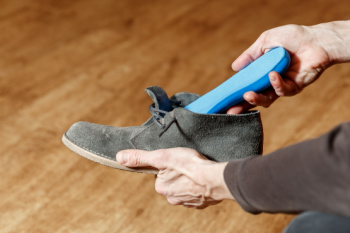
For older adults, balance can be enhanced with custom orthotics and carefully chosen footwear. Thin, firm-soled shoes with a high collar provide stability by limiting excessive foot motion, reducing the risk of falls. Custom orthotics further aid in balance by offering sensory feedback and biomechanical support, which can improve posture. Studies suggest some insoles can help boost balance, while others may not. When paired with well-fitted footwear, orthotics can stabilize the foot, allowing for better weight distribution and alignment. This combination reduces the risk of falls, making it a valuable intervention for older adults looking to maintain independence and mobility. If you fit in this age category, it is suggested that you schedule an appointment with a podiatrist to discuss whether custom orthotics can help improve your comfort and stability.
Custom orthotics and shoe inserts are not just for cushioning the soles; they are about supporting the foundation of our body - our feet. The advantages extend far beyond immediate relief from discomfort. These personalized solutions, that Our doctor can prescribe, can significantly impact a person’s posture, alleviate pain in various parts of the body, and even enhance athletic performance.
As we lace up our shoes each day, having the right support can make a world of difference. Custom orthotics are like tailored suites for our feet, offering a bespoke solution to address our unique biomechanical needs. They provide stability where it is lacking, correct imbalances, and ensure that every step is a confident and pain-free one.
Custom orthotics and shoe inserts offer long-term health benefits. By addressing issues such as overpronation or underpronation, heel pain, plantar fasciitis, etc. orthotics can help prevent injuries and mitigate the progression of existing conditions. It’s an investment not just in the present, but in the future health of your feet and consequently, your overall well-being.
If you have any questions please contact our office located in St. Petersburg, FL . We offer the newest diagnostic and treatment technologies for all your foot and ankle needs.
Foot Care Tips for Healthy Feet
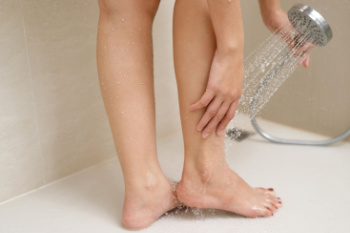
Proper foot care is essential for maintaining overall health and mobility. To keep your feet healthy, it is important to wash them regularly with mild soap and warm water, ensuring they are thoroughly dried to prevent fungal infections. Moisturizing the feet helps keep the skin soft and prevents dryness or cracking, particularly on the heels. Wearing well-fitting shoes that provide adequate support is vital for avoiding blisters, calluses, and foot pain. Additionally, it is important to trim toenails properly to prevent ingrown nails and infections. Regularly inspect your feet for any signs of injury, infection, or abnormal changes, such as swelling or discoloration. Those with diabetes, need to take extra care of their feet as nerve damage can reduce sensitivity. If you have foot pain or a specific foot condition, it is suggested that you consult a podiatrist who can offer relief tips, and guide you on everyday foot care practices.
Everyday foot care is very important to prevent infection and other foot ailments. If you need your feet checked, contact William Beaton, DPM from Advanced Podiatry and Wound Care. Our doctor can provide the care you need to keep you pain-free and on your feet.
Everyday Foot Care
Often, people take care of their bodies, face and hair more so than they do for their feet. But the feet are a very important aspect of our bodies, and one that we should pay more attention to. Without our feet, we would not be able to perform most daily tasks.
It is best to check your feet regularly to make sure there are no new bruises or cuts that you may not have noticed before. For dry feet, moisturizer can easily be a remedy and can be applied as often as necessary to the affected areas. Wearing shoes that fit well can also help you maintain good foot health, as well as making it easier to walk and do daily activities without the stress or pain of ill-fitting shoes, high heels, or even flip flops. Wearing clean socks with closed shoes is important to ensure that sweat and bacteria do not accumulate within the shoe. Clean socks help to prevent Athlete’s foot, fungi problems, bad odors, and can absorb sweat.
If you have any questions please feel free to contact our office located in St. Petersburg, FL . We offer the newest diagnostic and treatment technologies for all your foot and ankle needs.
Are You Suffering From Nerve Damage?
Habits That Can Cause Long-Term Damage to Your Feet
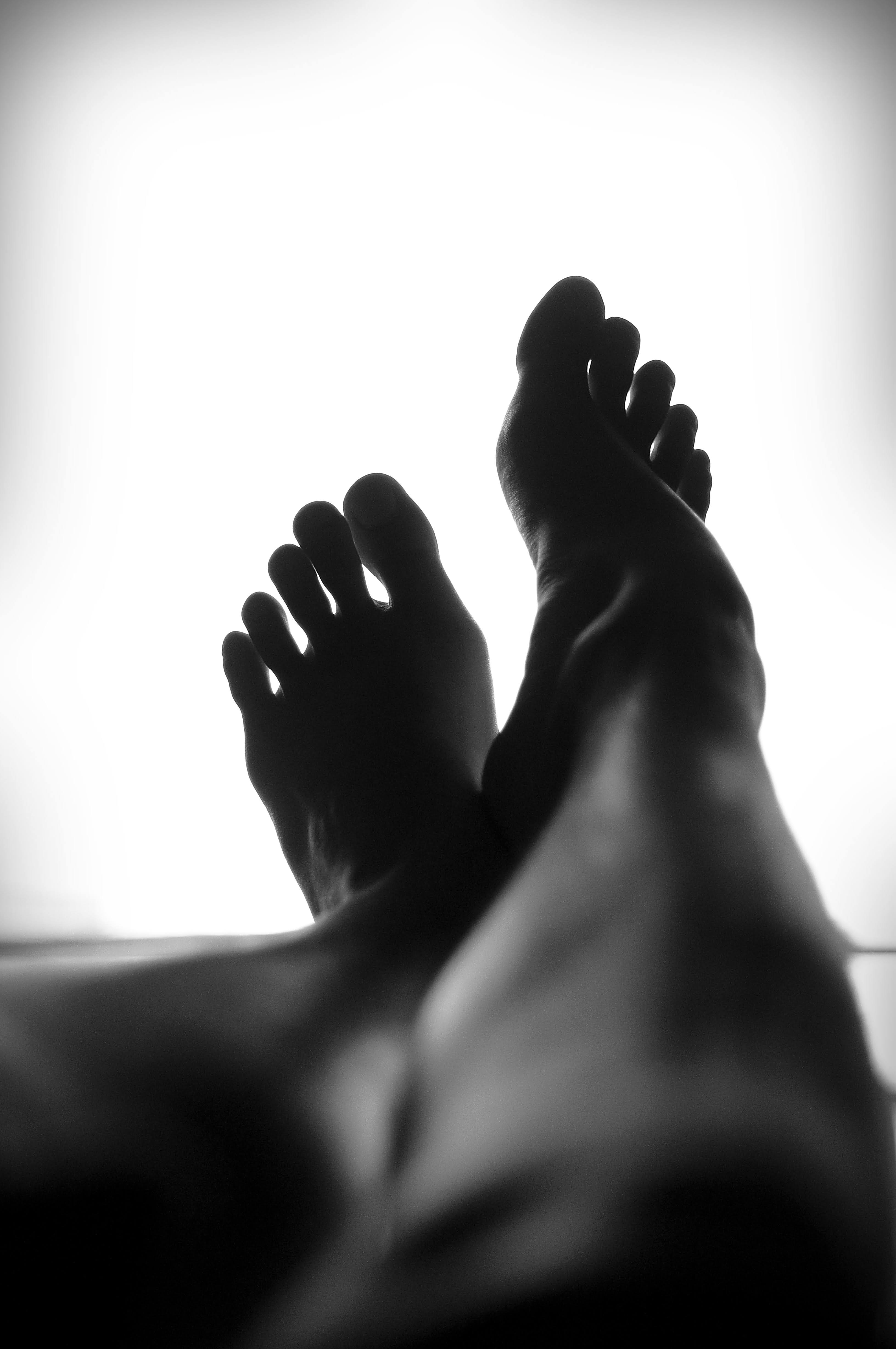
Foot health is an essential aspect of overall well-being, yet it often gets overlooked. Our feet bear the weight of our bodies and facilitate movement, allowing us to walk, run, and engage in various activities. This makes it crucial to adopt proper habits to protect them from injury and strain. Unfortunately, certain common practices, like wearing ill-fitting shoes or neglecting foot pain, can lead to long-term damage, affecting mobility and quality of life. It's important to pay attention to our feet and take proactive measures to ensure they remain healthy and strong throughout our lives. Read on to learn about some common foot habits that could cause long-term damage to your feet.
Wearing Ill-Fitting Shoes
A primary culprit in causing foot problems is the choice of ill-fitting shoes. Shoes that are too tight or too loose can lead to a range of issues, including blisters, bunions, and plantar fasciitis. High heels, in particular, are notorious for causing foot strain by placing excessive pressure on the toes. Opting for comfortable footwear that provides adequate support and fits well can prevent these issues and promote foot health.
Ignoring Foot Pain
Pain is the body’s way of signaling that something is wrong, and ignoring persistent foot discomfort can exacerbate underlying issues. Whether it's a sharp pain, a dull ache, or any other lingering sensation, it's crucial to seek medical advice. Early intervention can prevent minor problems from developing into more serious conditions, ensuring long-term foot health.
Walking Barefoot on Hard Surfaces
While walking barefoot can feel liberating, doing so on hard surfaces frequently can harm the feet. This practice can lead to injuries such as bruises, cuts, or even stress fractures. Additionally, without proper arch support, walking on hard terrain can exacerbate conditions like flat feet. Wearing supportive shoes can mitigate these risks and provide necessary protection.
Skipping Proper Foot Hygiene
Maintaining proper foot hygiene is vital in preventing infections and other foot-related issues. Skipping regular washing, nail trimming, and moisturizing can lead to problems such as fungal infections, ingrown nails, and dry, cracked skin. Prioritizing foot care by keeping feet clean and dry, trimming nails correctly, and moisturizing regularly ensures healthy feet and prevents infections.
Overlooking Regular Exercise
Although exercise is crucial for overall health, neglecting specific exercises to strengthen and stretch the feet can be detrimental. The feet are the foundation of our movement, and their health is vital for maintaining balance and stability. Exercises targeting the feet and ankles help maintain flexibility and strength, reducing the risk of injuries such as sprains or strains. Simple activities like toe curls, which involve gripping a towel with your toes, calf raises that strengthen the lower leg muscles, and ankle rotations to improve joint mobility can keep the feet in top condition. These exercises are easy to incorporate into a daily routine and can significantly enhance foot health and overall well-being.
Neglecting Regular Foot Check-ups
Just as regular health check-ups are essential for maintaining your overall well-being, periodic foot evaluations are crucial for proactive foot health management. Many foot-related issues can progress without noticeable symptoms until they become severe. A professional foot check-up can identify potential problems early, such as changes in skin texture, toenail health, or any signs of infection. Regular visits to a podiatrist can ensure that minor issues are addressed promptly, preventing them from escalating into more serious conditions and contributing to long-term foot health.
Prioritizing foot health is an indispensable aspect of overall wellness, influencing mobility and quality of life. By making informed choices, such as wearing well-fitting supportive shoes, actively listening to your body's signals, and maintaining diligent foot hygiene, you set the foundation for enduring foot health. Incorporating targeted exercises and scheduling regular foot check-ups can further enhance foot function, preventing potential problems. Remember, taking proactive measures today not only ensures the health of your feet but also supports a highly active, pain-free lifestyle in the years to come. By recognizing and rectifying these harmful habits, you can take proactive steps to ensure the longevity and health of your feet. Contact our team today to learn more.
Ingrown Toenails
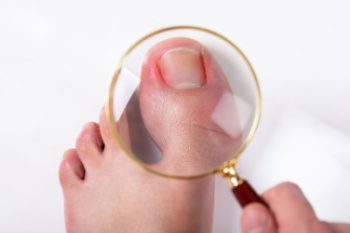
Ingrown toenails occur when the edges of the nail grow into the surrounding skin, causing pain, redness, and swelling. This can happen on any toe but is most common on the big toe. Ingrown toenails can develop at the side or tip of the nail, with inner side ingrown toenails being more common. The primary causes include improper nail trimming, such as cutting nails too short or rounding the corners, wearing tight shoes, injury to the toe, or having naturally curved nails. Infections may also develop if left untreated, leading to pus, increased pain, and swelling. Treatment typically involves soaking the foot, applying antibiotics, and, in severe cases, surgically removing part of the nail. A podiatrist can provide expert care by gently removing the ingrown portion of the nail, offering pain relief, and advising on proper nail care to prevent recurrence. If you have an ingrown toenail, it is suggested that you schedule an appointment with a podiatrist for effective treatment and relief.
Ingrown toenails can become painful if they are not treated properly. For more information about ingrown toenails, contact William Beaton, DPM of Advanced Podiatry and Wound Care. Our doctor can provide the care you need to keep you pain-free and on your feet.
Ingrown Toenails
Ingrown toenails occur when a toenail grows sideways into the bed of the nail, causing pain, swelling, and possibly infection.
Causes
- Bacterial infections
- Improper nail cutting such as cutting it too short or not straight across
- Trauma to the toe, such as stubbing, which causes the nail to grow back irregularly
- Ill-fitting shoes that bunch the toes too close together
- Genetic predisposition
Prevention
Because ingrown toenails are not something found outside of shoe-wearing cultures, going barefoot as often as possible will decrease the likeliness of developing ingrown toenails. Wearing proper fitting shoes and using proper cutting techniques will also help decrease your risk of developing ingrown toenails.
Treatment
Ingrown toenails are a very treatable foot condition. In minor cases, soaking the affected area in salt or antibacterial soaps will not only help with the ingrown nail itself, but also help prevent any infections from occurring. In more severe cases, surgery is an option. In either case, speaking to your podiatrist about this condition will help you get a better understanding of specific treatment options that are right for you.
If you have any questions please feel free to contact our office located in St. Petersburg, FL . We offer the newest diagnostic and treatment technologies for all your foot and ankle needs.

